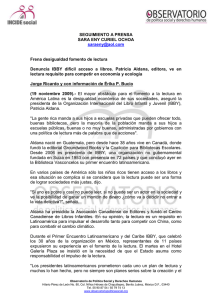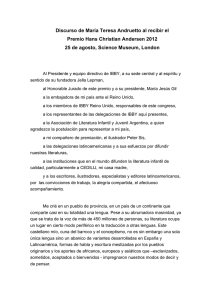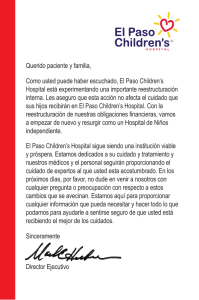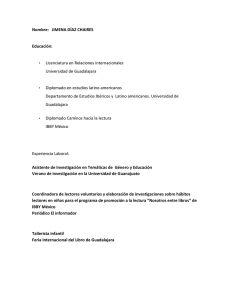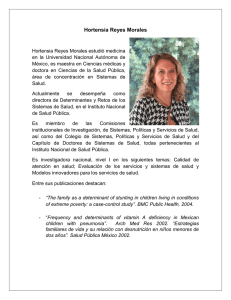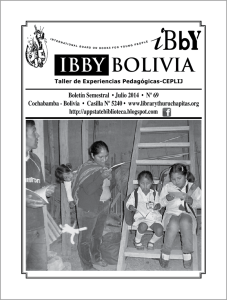viernes - los congresos del IBBY
Anuncio
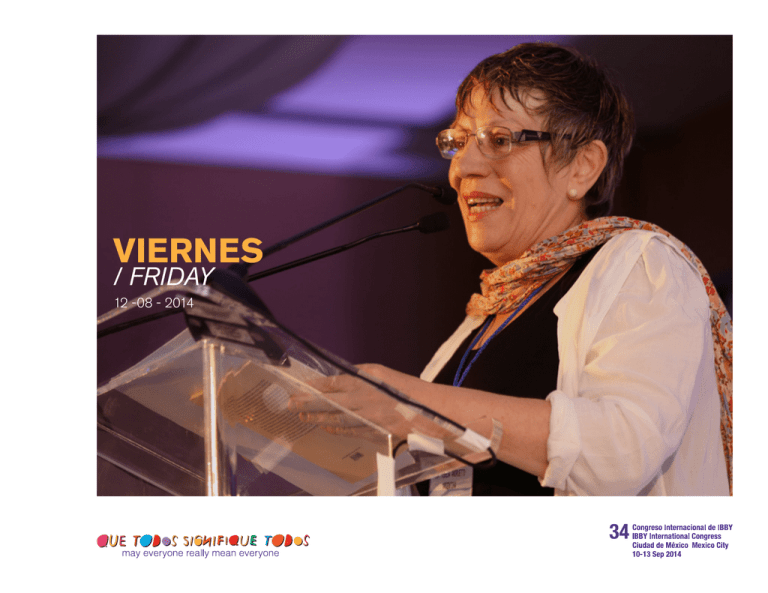
VIERNES / FRIDAY 12 -08 - 2014 VIERNES / FRIDAY A las 9:00 horas del viernes 12 de septiembre, dio inicio la sesión plenaria. At 9:00 hrs on Friday, September 12, the plenary session was opened. La jornada del Congreso inició con la tercera Sesión Plenaria, cuyo eje temático fue “La literatura como una casa hospitalaria”. La escritora María Teresa Andruetto (Argentina), dio la conferencia magistral “Que todos signifique todos, pero ¿qué es todos?”, en la que señaló que la escritura que se alimenta de la experiencia y de la conciencia de quien escribe, propicia una unión entre el lector y el autor que hace visibles a los otros, a aquéllos en los que todos nos reconocemos. The day of the Congress began with the third Plenary Session, which thematic axis was “Literature as a hospitable home”. The writer María Teresa Andruetto (Argentina) gave the keynote address called “May everyone really mean everyone, but what is everyone?”, saying that the writing that feeds on the experience and consciousness of the writer, promotes connection between the reader and the author who makes others visible — to those people in which we all recognize ourselves. A continuación comenzó la mesa de diálogo moderada por Daniel Goldin (México) quien invitó a los participantes, Luis Bernardo Yepes (Colombia), María Baranda (México), Gusti (Argentina-España) y Jochen Weber Then the round table moderated by Daniel Goldin (Mexico) began. Goldin invited Luis Bernardo Yepes (Colombia), María Baranda VIERNES / FRIDAY (Alemania), a conversar alrededor de la idea de la literatura como una casa hospitalaria, la literatura para los otros. Durante la charla, los ponentes, coincidieron en hablar de la literatura como la casa hospitalaria, ese lugar en donde todos son invitados a entrar y habitar, una casa con puertas para salir y entrar cada vez que se quiera, una casa en donde todo es posible, sobre todo sanar. (Mexico), Gusti (Argentina-Spain) and Jochen Weber (Germany) to talk about the idea of literature as a hospitable home, the literature for others. The speakers agreed to talk on literature as the hospitable home — that place where all are invited to enter and inhabit; a house with doors to come and go whenever you want; a house where everything is possible, especially being healed. Posterior a la conferencia magistral y a la mesa de diálogo se dio inicio a: Otro calor de aliento. Otras formas de llamarnos México, por Mardonio Carballo (México), quien habló de la poesía náhuatl y declamó, con toda su musicalidad, algunos poemas en dicha lengua. After the keynote address and the roundtable started: Another heat of breath. Other ways to call ourselves Mexico, by Mardonio Carballo (Mexico), who spoke about Nahuatl poetry and recited —with all its musicality— some poems in this language. En la ceremonia de presentación y entrega de la Lista de Honor IBBY 2014 se proyectaron los libros de autores, ilustradores y traductores, mismos que fueron seleccionados por las diferentes secciones de IBBY. Piezas de música tradicional mexicana acompañaron la presentación, para agasajar al país anfitrión. Los integrantes de la Lista de Honor que estuvieron presentes fueron: At the presentation ceremony and awarding of the 2014 IBBY Honour List, books of authors, illustrators and translators were projected, which were selected by the different IBBY sections. Pieces of traditional Mexican music were part of the presentation, to honor the host country. The following members of the Honour List were present: VIERNES / FRIDAY Ronnie Andersen (Dinamarca), María Teresa Andruetto (Argentina), Stana Anzelj (Eslovenia), Lina Dudate (Lituania), Raimonda Jonkute (Lituania), Regina Lukk-Toompe (Estonia), Mito Mahara (Japón), Radek Maly (República Checa), Kathleen Merz (Estados Unidos), Valerie Moir (Chile), Rosario Moyano (Bolivia), Verónica Murguía (México), Branka Primorac (Croacia), Diana Luz Sánchez (México), Allar Sooneste (Estonia), Richard Zela (México) y Lina Zutaute (Lituania). Ronnie Andersen (Denmark), María Teresa Andruetto (Argentina), Stana Anzelj (Slovenia), Lina Dudate (Lithuania), Raimonda Jonkute (Lithuania), Regina Lukk-Toompe (Estonia), Mito Mahara (Japan), Radek Maly (Czech Republic), Kathleen Merz (United States), Valerie Moir (Chile), Rosario Moyano (Bolivia), Verónica Murguía (Mexico), Branka Primorac (Croatia), Diana Luz Sánchez (Mexico), Allar Sooneste (Estonia), Richard Zela (Mexico) and Lina Zutaute (Lithuania). A los galardonados se les agasajó con una comida en la que convivieron con miembros de IBBY. A great lunch was served to the winners while they talked with members of IBBY. A las 15:00 horas comenzó la siguiente Sesión Plenaria con la Conferencia Magistral “La luz de la oscuridad” de Yolanda Reyes (Colombia), alrededor del eje temático: “La literatura: un espacio en el que todos podemos reconocernos”, en la cual hizo hincapié en que la literatura es el lugar donde niños, jóvenes y adultos pueden curar sus heridas. The next plenary session started at 15:00 with the keynote address entitled “Light of Darkness” (“La luz de la oscuridad”) by Yolanda Reyes (Colombia), which thematic axis was: “Literature: a space where we can all recognize ourselves”, she emphasized that literature is the place where children, youngsters and adults can heal wounds. VIERNES / FRIDAY Continuando con el mismo tema, inició la mesa de diálogo con Luis González (España), como moderador, quien lanzó a los participantes diversas preguntas sobre el asunto de la inclusión-exclusión pues éste suscita desafíos capaces de ser descifrados en la creación. En este panel participaron: Brenda Bellorín (Venezuela), Roberto Innocenti (Italia), Pablo Larraguibel (Venezuela- España) y Morteza Zahedi (Irán); hablaron desde su experiencia como escritores, ilustradores e editores pero donde todos, de alguna manera u otra, coincidieron en que la literatura es un mundo inmenso y cada vez hay más posibilidades de acercarse a ella para poder tener así un amplio conocimiento de la realidad. Continuing with the same subject, the round table began with Luis González (Spain) as moderator, who asked the participants several questions on the issue of inclusion-exclusion, as this theme raises challenges that can be decrypted in the creation. In this panel participated: Brenda Bellorín (Venezuela), Roberto Innocenti (Italia), Pablo Larraguibel (Venezuela- Spain) and Morteza Zahedi (Iran). They spoke from their experience as writers, illustrators and publishers but everyone —in some way or another— agreed that literature is a huge world and now there are more opportunities to approach it in order to have a wider knowledge of reality. VIERNES / FRIDAY Posteriormente, a las 16:30 horas comenzaron las sesiones paralelas las cuales estuvieron dividas de la siguiente forma: Then, at 16:30 started the parallel sessions that were divided as follows: Sesión 7. Moderadora: Evelyn Freeman. (EUA). Session 7 Moderator: Evelyn Freeman (USA) Ponentes: Tilka Jamnik. Presidente de IBBY Eslovenia. (Eslovenia). ¿Será verdad que los libros infantiles con uso de Internet dan una experiencia inclusiva más profunda a llos jóvenes lectores modernos? Speakers: Tilka Jamnik, President of IBBY Slovenia (Slovenia) Is it true that Internet children’s books give a deeper inclusive experience for young modern readers? Junko Yokota. Universidad Nacional de Luis. (EUA/Japón). Libros electrónicos y aplicaciones para niños: ¿acceso para todos? Junko Yokota, National Louis University (USA/Japan) EBooks and apps for kids: access for all? Helena Vermcrants. Bibliotecaria, crítica e intérprete. (Suecia). El puente de los libros - una forma inclusiva de la promoción del libro. Una cooperación entre la biblioteca Municipal y las escuelas. Helena Vermcrants, Librarian, critic and interpreter (Sweden) The book bridge — an inclusive form of book promotion. A cooperation between the Municipal library and schools. Ruth E. Quiroa. Profesora adjunta. (EUA). El maravilloso mundo de los libros sin palabras: textos complejos con acceso abierto. Sesión 8. Moderadora: Ferelith Hordon. (Reino Unido). Ponentes: Jamie Campbell Naidoo. Profesor de la Universidad de Alabama (EUA). Y Robert Bittner. Pasante de postgrado en la Universidad de Simon Fraser. (EUA). Diversidad en los niños “Raros” y la literatura juvenil. Dr. Robin Morrow. Editor. (Australia). Mensajes contradictorios: los libros ilustrados de Australia, más hospitalarios que nuestros discursos políticos. Ruth E. Quiroa, Assistant Professor (USA) The wonderful world of wordless books: complex texts with open access. Session 8 Moderator: Ferelith Hordon (United Kingdom) Speakers: Jamie Campbell Naidoo, Professor at the University of Alabama (USA) and Robert Bittner, Postgraduate Intern of Simon Fraser University (USA) Diversity in “Weird” children and youth literature. Dr. Robin Morrow, Editor (Australia) Contradictory messages: Australian picture books — more hospitable than our political discourse. VIERNES / FRIDAY Wafa Thabet Mezghani. Profesor del Instituto Superior de Estudios Tecnológicos. (Túnez). Literatura de exclusión en Túnez. ¿Qué y cómo? Sesión 9. Moderador: Wally De Doncker. (Bélgica) Ponentes: Nicola Daly y Marion McKoy. Universidad de Waikat. (Nueva Zelanda). Colecciones d elibros ilustrados como herramientas pedagógicas en diversas aulas. Deborah Soria. Autora. (Italia). Un tesoro para una isla. Majo De Saedeleer. Directora de la fundación de la lectura. (Bélgica). O Mundo: Una colección inetrnacional de libros ilustrados. Marcella Terrusi. Universidad de Bolonia. (Italia). Libro en silencio para la inclusión: el amplio horizonte de los Libros ilustrados sin palabras. Sesión 10. Moderadora: Angela Lebedeva. (Rusia). Ponentes: Sahar Tarhandeh. Diseñadora gráfica. (Irán). Publicaciones exclusivas. Dra. Donna Sayers Adomat. Universidad de Indiana. (EUA). Como se representa la discapacidad en los libros ilustrados de todo el mundo. Philippe Claudet. Autor. (Francia). La inclusión puede ser una realidad. Dra. Sabah Abdelkarim Aisiwi. Universidad de Dammam. (Arabia Saudita). Literatura para niños de discapacidad, teoría literaria y el concepto de inclusión. Wafa Thabet Mezghani, Professor at the Higher Institute of Technological Studies (Tunisia) Exclusion literature in Tunisia. What and how? Session 9 Moderator: Wally De Doncker (Belgium) Speakers: Nicola Daly and Marion McKoy, Waikat University (New Zealand). Collections of picture books as educational tools in diverse classrooms. Deborah Soria, Author (Italy) A treasure for an island. Majo De Saedeleer, Director of the reading foundation (Belgium) Oh World: An international collection of picture books. Marcella Terrusi, University of Bologna (Italy) Silent book for inclusion: the wide horizon of wordless picture books. Session 10 Moderator: Angela Lebedeva (Russia) Speakers: Sahar Tarhandeh, Graphic designer (Iran) Exclusive publications. Dr. Donna Sayers Adomat, Indiana University (USA) How disability is depicted in picture books worldwide. Philippe Claudet, Author (France) Inclusion may be a reality. Dr. Sabah Abdelkarim Aisiwi, University of Dammam (Saudi Arabia) Disability Children’s Literature, literary theory and the concept of inclusion. Session 11 Moderator: Akoss Ofori-Mensah (Ghana). VIERNES / FRIDAY Sesión 11. Moderadora: Akoss Ofori-Mensah. (Ghana). Ponentes: Hossein Sheykh Rezaee. Instituto de Filosofía. (Irán). Las representaciones de “Diferencias” y la “Otredad” en la literatura infantil Persa. Jehan Helou. Presidente de IBBY Palestina. (Palestina). Los niños en situaciones de crisis, Palestina bajo la ocupación. Timotea Vráblová. Instituto de literatura Eslovaca de la Academia de Ciencias Eslovaca. (Eslovaquia). Aquellos que son débiles pueden ser fuertes entre nosotros. Nina Aalstad. Editora y empresaria. (Noruega). La lectura y la escritura es un derecho, no un privilegio. Sesión 12. Moderadora: Marcela Karekye. (Uganda). Ponentes: Kestutis Urba. Universidad de Vilnus. (Lituania). Personajes no coincidentes en los cuentos de hadas ¿la idea de Inclusión? Sabine Fuchs. Especialista en literatura infantil. (Australia). Imágenes e historias de inclusión - Obras de Franz-Joseph Huainigg. Zohreh Ghaeni. Instituto de investigaciones sobre la historia de la literatura para niños. (Irán). Lee conmigo. De manera simultánea, se presentó la nueva colección Kipatla, una colección de 13 historias publicadas por el Consejo Nacional para Prevenir Speakers: Hossein Sheykh Rezaee, Institute of Philosophy (Iran) Representations of “Differences” and “Otherness” in Persian children’s literature. Jehan Helou, President of IBBY Palestine (Palestine) Children in crisis situations, Palestine under occupation. Timotea Vráblová, Institute of Slovak Literature of the Slovak Academy of Sciences (Slovakia). Those who are weak can be strong among us. Nina Aalstad, Editor and businesswoman (Norway) Reading and writing is a right, not a privilege. Session 12 Moderator: Marcela Karekye (Uganda) Speakers: Kestutis Urba, University of Vilnius (Lithuania) Unmatched characters in fairy tales - the idea of Inclusion? Sabine Fuchs, Specialist in children’s literature (Australia) Images and stories of inclusion - Works of Franz-Joseph Huainigg. Zohreh Ghaeni, Institute for research on the history of children’s literature (Iran)Read with me. Simultaneously, the new Kipatla collection —13 stories published by the National Council to Prevent Discrimination— was presented in collaboration with IBBY México/A leer. They are stories that address the various manifestations of discrimination through the experiences of the inhabitants of a small city — the city of Kipatla. VIERNES / FRIDAY la Discriminación y en colaboración con IBBY México/A leer. Son historias que abordan las diversas manifestaciones de la discriminación a través de las vivencias de los habitantes de una pequeña ciudad, la ciudad de Kipatla. Un poco más tarde, todos los participantes y conferencistas se trasladaron al Papalote Museo del Niño para el evento de premiación IBBY-Asahi. Este premio, otorgado por IBBY y patrocinado Asahi Shimbun, se instituyó en 1986 durante el Congreso de IBBY en Tokio. Se otorga cada dos años a dos grupos o instituciones cuyas acciones contribuyen de manera notable a la promoción de la lectura entre niños y jóvenes. Las iniciativas son postuladas por las Secciones Nacionales de IBBY y pueden incluir proyectos de todo el mundo. Los integrantes del jurado son miembros del Comité Ejecutivo de IBBY. La elección de los ganadores va de acuerdo a ciertos criterios: •Cumplir con los preceptos de la Misión de IBBY •Contar con financiamiento para su operación •Tener al menos dos años de operación previos a la nominación •Ser original e innovador De los 14 candidatos para la edición 2014, los dos proyectos ganadores fueron: The Children’s Book Bank de Canadá y PRAESA - The Project for Study of Alternative Education de Sudáfrica. Tamura Asahi, en su discurso a los galardonados dijo: “ Los ganadores son seleccionados entre diversos proyectos nominados por sectores nacionales de IBBY en todo el mundo. Esto significa que el premio representa el espíritu de IBBY; es decir, la red de personas que trabajan para conectar a los niños con los libros en cada esquina del mundo”. Después de la intervención del Sr Asahi, se dio paso a la premiación. Las representantes de los programas galardonados, además de agradecer el premio, mostraron a los asistentes los proyectos ganadores. A bit later, all participants and lecturers moved to the Papalote Children’s Museum (Papalote Museo del Niño) for the IBBY-Asahi award ceremony. This prize, awarded by IBBY and sponsored by Asahi Shimbun, was established in 1986 during the IBBY Congress in Tokyo. It is awarded every two years to two groups or institutions, which actions contribute significantly to the promotion of reading among children and youth. Initiatives are nominated by the National Sections of IBBY and may include projects worldwide. The jurors are members of the Executive Committee of IBBY. The choice of winners is according to certain criteria: •Meet the requirements of IBBY’s Mission. •Have funding for their operation. •Have at least two years of operation prior to the nomination. •Be original and innovative. Of the 14 candidates for the 2014 edition, the two winning projects were: The Children’s Book Bank of Canada and PRAESA - The Project for Study of Alternative Education of South Africa. Tamura Asahi, in her speech to the winners said: “Winners are selected from various projects nominated by national sectors of IBBY worldwide. This means that the award represents the spirit of IBBY; i.e., the network of people working to connect children with books in every corner of the world”. After the intervention of Mr. Asahi the awards started. The representatives of the winning programs, besides thanking the award, showed the winning projects to the attendees. The Children’s Book Bank of Canada was founded in 2007 with the mission of supporting children’s literacy by recycling good-quality used VIERNES / FRIDAY The Children’s Book Bank de Canadá fue fundado en el 2007 con la misión de apoyar la alfabetización infantil por medio del reciclaje de libros usados de buena calidad y distribuirlos de manera gratuita en comunidades necesitadas. PRAESA - The Project for Study of Alternative Education de Sudáfrica es una unidad independiente para la investigación y desarrollo afiliado a la Universidad de Ciudad del Cabo. Fue establecida como resultado de la lucha contra la educación del apartheid y su función inicial fue la de documentar alternativas ya utilizadas que pudieran guiar a un nuevo proceso educativo. books and by their free distribution in needy communities. PRAESA - The Project for the Study of Alternative Education in South Africa is an independent unit for research and development affiliated to the University of Cape Town. It was established as a result of the struggle against the apartheid education and its initial role was documenting alternatives already used that would lead to a new educational process. The Executive Director of “The Children’s Book Bank” of Canada, Kim Beatty, thanked the award and the invitation to the Congress, making a VIERNES / FRIDAY La Directora Ejecutiva de “The Children’s Book Bank” de Canadá, Kim Beatty, agradeció el premio y la invitación al Congreso, ofreciendo un discurso donde mencionó el gran entusiasmo que tiene su equipo por promover la lectura infantil y también habló del esfuerzo que han hecho para poder llegar a obtener tales resultados. Agradeció el apoyo de IBBY y de Asahi, así como de quienes apoyan al proyecto y les gustaría implementarlo también en sus comunidades sin importar la parte del mundo donde se encuentren. Cerró con estas palabras: “Recibir el premio Asahi Promoción de Lectura (Asahi Reading Promotion), es un gran honor para el Banco de Libros. El reconocimiento y credibilidad internacional asociados a este premio ha beneficiado enormemente al Banco de Libros y les puedo asegurar que los 10,000 USD serán utilizados de manera correcta para continuar nuestra misión de proveer libros gratuitos y apoyo literario a niños de comunidades de escasos recursos que viven en Toronto. Gracias nuevamente.” La Directora de PRAESA Carole Bloch, en sus palabras de agradecimiento relató cuál la fuente de inspiración para comenzar el proyecto. Mencionó los conflictos políticos y sociales del apartheid que repercutieron en los procesos de educación de Sudáfrica, y cómo han buscado revertirlos. Concluyó con el siguiente mensaje: “Este premio llega a nosotros en un momento maravillosos: PRAESA está llevando a cabo una campaña nacional de lectura por placer: Nal’ibali, que significa “he aquí la historia” en Xhosa. Amamos lo que hacemos, a pesar de toparnos con muchos retos: como motivar a los adultos para que quieran leerles a los niños, ayudándoles así a crear espacios para sesiones regulares, capacitándolos, creando materiales de lectura apropiados; y por supuesto, asegurando que esto continúe creciendo, libro por libro. Es bueno saber que tenemos el apoyo de amigos. ¡Gracias!” Después de la premiación todos los invitados, entre los que se encontraba el Embajador de Sudáfrica en México, permanecieron en el convivio donde se ofrecieron bebidas y canapés. No faltaron los que disfrutaron las actividades que ofrece el museo al interior. speech where she mentioned the great enthusiasm that her team has to promote children’s reading. She also talked about the effort they have made to obtain such results. She acknowledged the support of IBBY and Asahi, as well as other people who support the project and would like to implement it in their communities no matter what part of the world they happen to be. She finished with these words: “Receiving the Asahi Reading Promotion award is a great honor for the Bank of Books. The international recognition and credibility associated to this award has greatly benefited the Bank of Books and I can assure you that the $10,000 USD will be used properly with the purpose of continuing our mission to provide free books and literary support for children of poor communities living in Toronto. Thank you again.” The Director of PRAESA, Carole Bloch, in her thank you speech recounted what was the inspiration for starting the project. She mentioned political and social conflicts of apartheid that affected the processes of education in South Africa, and how they have tried to make it up. She concluded with the following message: “This prize comes to us on a wonderful time: PRAESA is conducting a national reading-for-pleasure campaign: Nal’ibali, which means “here is the story” in the Xhosa language. We love what we do, despite running into many challenges: such as encouraging adults to read to their children, helping them to create spaces for regular sessions, training them, creating appropriate reading materials; and of course, ensuring that it continues to grow, book by book. It is good to know that we have the support of friends. Thank you! After the award ceremony the guests, including the South African Ambassador in Mexico, stayed for a while enjoying drinks and canapés. Some guests even enjoyed the activities of the museum. VIERNES / FRIDAY VIERNES / FRIDAY
